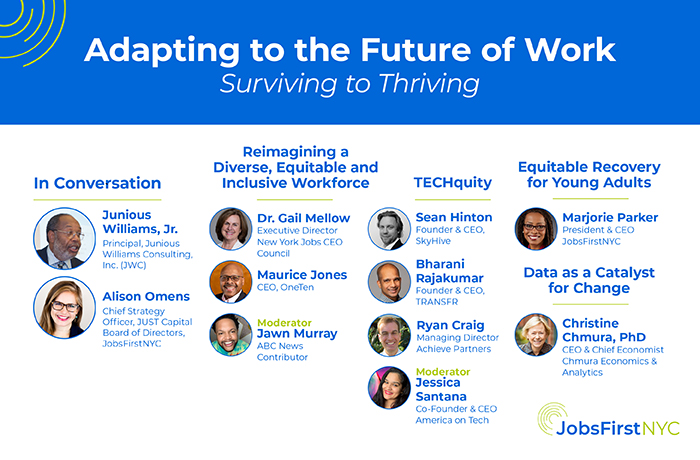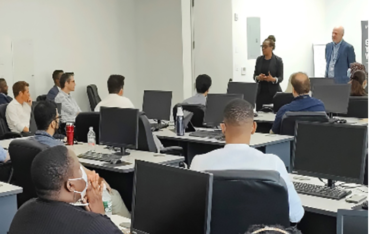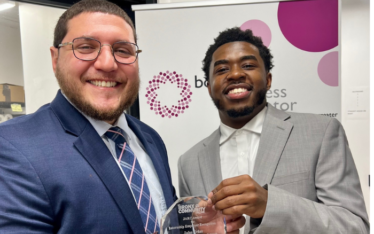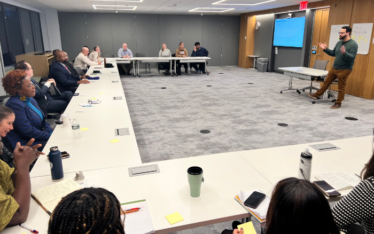The sixth annual JobsFirstNYC Adapting to the Future of Work event designed for professionals was held in July 2021. The convening featured thought leaders and transformers from the public, private, and nonprofit spheres who gathered online to examine disparities in education and training and to present new solutions to the extensive and complex workforce issues that the COVID19 pandemic has exacerbated. The event was the second of a two-day series titled Surviving to Thriving, with panels focused on issues of TECHquity and Diversity, Equity, and Inclusion (DEI). A convening like this provides a virtual space for sharing visionary ideas and implementable solutions that can advance equity as a central driver for responding to a changing work environment that should benefit everyone. Based on current trends, organizations that nurture a nimble and multidimensional workforce are the ones most likely to thrive. Essential insights from the 2021 Adapting to the Future of Work Convening Alan Momeyer, Chair, JobsFirstNYC Board of Directors, delivered a welcome message, which underscored the importance of seizing new opportunities to bring employers to the table. As Momeyer put it, “The difference is, this time, as employers come out of it, they are realizing that they need us [workforce development organizations], and they need us to help them find the right people for their jobs and retain those people. That is the job of JobsFirstNYC, and that is the job of all the people you represent.” Marjorie Parker, President and CEO of JobsFirstNYC, underscored Mr. Momeyer’s sentiment by reiterating the value in creating a more equitable workforce and education system to support a strong, diverse talent pipeline to adapt to the future of work. The first hour featured a conversation between Alison Omens, Chief Strategy Officer, JUST Capital, and Junious Williams Jr., Principal of Junious Williams Consulting, Inc. Williams, an experienced labor and social justice trailblazer, noted, “What is really pressing to understand about the future of work is to understand the broader societal change that is going on around the issue of income and the relationship between income and worth. One of the most important things going on right now that we should all pay attention to, which will redefine the nature of work in this country, is Guaranteed Basic Income. That is a game-changer.” The Reimagining a Diverse Equitable and Inclusive Workforce panel made up of DEI visionaries Maurice Jones, Chief Executive Officer, OneTen; Dr. Gail Mellow, Executive Director, New York Jobs CEO Council; Kelly Flammia, Associate Director, Accenture; and moderated by Jawn Murray, ABC News Contributor and social critic provided a robust discussion on the challenges and solutions that companies are using to implement equitable recruitment, promotion, and retention policies. According to Flammia, “Employers must be more honest about what is truly required to do the job…certification programs, boot camps, micro-credentialing, and community colleges are all ways to build the necessary skills that fit the jobs.” With many U.S. workers now working remotely or in a hybrid office environment, digital and technological equity has become a hot issue in adapting to the future of work. Equity in technology or TECHquity innovators sought to address disparities in access to and uses of technology because of differences in socioeconomic status, gender, ability level, racial and ethnic identification, geographic location, and handicapping condition. The expert TECHquity panel included: Ryan Craig, Managing Director, Achieve Partners; Sean Hinton, Founder and CEO, SkyHive; Bharani Rajakumar, Founder and CEO, TRANSFR; and moderated by Jessica Santana, Co-Founder and CEO, America on Tech. The consensus among the TECHquity pundits was that intermediaries can drive action towards developing an immersive apprenticeship option and should play a considerable role in enacting technological equity. Rajakumar emphasized that “Nonprofits are going to play a huge role in helping communities, especially those in hard to reach areas.” The event culminated with a special presentation titled Data as a Catalyst for Change: The Pandemic’s Impact on 18- to 24-Year Olds, during which Christine Chmura, CEO and Chief Economist, Chmura Economics & Analytics, alongside Marjorie Parker, President & CEO, JobsFirstNYC, delved into factors that have triggered historically high numbers of out-of-school, out-of-work young adults in New York City. See the all-star lineup of speakers from Day 2 in Adapting to the Future of Work Booklet Adult Day





